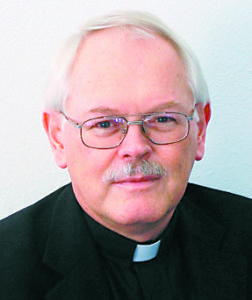
Father Ron Rolheiser, OMI
IN EXILE
By Father Ron Rolheiser, OMI
I’ve been both blessed and cursed by a congenital restlessness that hasn’t always made my life easy. I remember as a young boy restlessly wandering the house, the yard, and then the open pastures of my family’s farm on the prairies. Our family was close, my life was protected and secure, and I was raised in a solid religious faith. That should have made for a peaceful and stable childhood and, for the most part, it did. I count myself lucky.
But all of this stability, at least for me, didn’t preclude an unsettling restlessness. More superficially, I felt this in the isolation of growing up in a rural community that seemed far removed from life in the big cities. The lives I saw on television and read about in the newspapers and magazines appeared to me to be much bigger, more exciting, and more significant than my own. My life, by comparison, paled, seemed small, insignificant, and second-best. I longed to live in a big city, away from what I felt to be the deprivations of rural life. My life, it seemed, was always away from everything that was important.
Beyond that, I tormented myself by comparing my life, my body, and my anonymity to the grace, attractiveness, and fame of the professional athletes, movie stars, and other celebrities I admired and whose names were household words. For me, they had real lives, ones I could only envy. Moreover, I felt a deeper restlessness that had to do with my soul. Despite the genuine intimacy of a close family and a close-knit community within which I had dozens of friends and relatives, I ached for a singular, erotic intimacy with a soulmate. Finally, I lived with an inchoate anxiety that I didn’t understand and which mostly translated itself into fear, fear of not measuring up and fear of how I was living life in face of the eternal.
That was the cursed part, but all of this also brought a blessing. Inside the cauldron of that disquiet I discerned (heard) a call to religious life which I fought for a long time because it seemed the antithesis of everything I longed for. How can a burning restlessness, filled with eros, be a call to celibacy? How can an egotistical desire for fame, fortune, and recognition be an invitation to join a religious order whose charism is to live with the poor? It didn’t make sense, and, paradoxically, that’s why, finally, it was the only thing that did made sense. I gave in to its nudging and it was right for me.
It landed me inside religious life and what I’ve lived and learned there has helped me, slowly through the years, to process my own restlessness and begin to live inside my own skin. Beyond prayer and spiritual guidance, two intellectual giants in particular helped me. As a student, aged 19, I began to study Saint Augustine and Thomas Aquinas. My mind was still young and unformed but I grasped enough of what I was reading to begin to befriend the restless complexities inside my own soul – and inside the human soul in general. Even at age 19 (maybe particularly at 19) one can existentially understand Augustine’s dictum: You have made us for yourself, Lord, and our hearts are restless until they rest in you.
And then there was Thomas Aquinas who asked: What is the adequate object of the human intellect and will? In short, what would we have to know and be in love with in order to satisfy every flame of restlessness within us? His answer: Everything! The adequate object of the human intellect and will is Being as such – God, all people, all nature. Only that would satisfy us.
Except … that’s not what we mostly think. The particular restlessness that I experienced in my youth is today in fact a near-universal disease. Virtually all of us believe that the good life is had only by those who live elsewhere, away from our own limited, ordinary, insignificant, and small-town lives. Our culture has colonized us to believe that wealth, celebrity, and comfort are the adequate object of the human intellect and will. They are, for us, “Being as such.” In our culture’s current perception, we look at the beautiful bodies, celebrity status, and wealth of our athletes, movie stars, television hosts, and successful entrepreneurs and believe that they have the good life and we don’t. We’re on the outside, looking in. We’re now, in effect, all farm kids in the outback envying life in the big city, a life accessible only to a highly select few, while we’re crucified by the false belief that life is only exciting elsewhere, not where we live.
But our problem is, as Rainer Marie Rilke once pointed out to an aspiring young poet who believed that his own humble surroundings didn’t provide him with the inspiration he needed for poetry, that if we can’t see the richness in the life we’re actually living then we aren’t poets.
(Oblate Father Ron Rolheiser, theologian, teacher and award-winning author, is President of the Oblate School of Theology in San Antonio, TX.)
